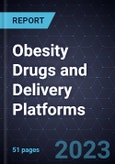GLP-1-based Drugs, Along With Injector and Nanomaterial Delivery Platforms, Drive Transformational Industry Growth
The increasing disposable incomes in developing countries have contributed to a sedentary lifestyle worldwide. The advent of food delivery apps has also increased accessibility to various culinary delights. These factors have contributed mainly to obesity and other lifestyle diseases.
People with a body mass index (BMI) of more than or equal to 30 (or 27kg/m2) are classified as obese and may or may not have co-morbidities. Obesity is also known to increase the risk of several diseases, such as type 2 diabetes, cancer mortality, overall mortality, and cardiovascular disorders. It also worsens the prognosis of several diseases and other related co-morbidities.
An active lifestyle with healthy eating practices is crucial for maintaining optimal BMI. Dietary supplementation with fibers, vitamins, minerals, probiotics, and other nutrients can also help manage weight. In addition, healthcare professionals are exploring behavioral interventions for obesity management. Bariatric surgery is the gold standard for obesity treatment. However, recent therapeutic advancement has enabled the launch of oral and injectable drugs for weight loss. GLP-1-based obesity treatments are fast emerging as potent treatment options for obesity and have a favorable safety profile.
In this study, the emerging and recently approved obesity treatment pipelines and associated advances in drug delivery technologies are analyzed. The study also provides insights into funding, the collaborative landscape of obesity treatments and delivery platforms, the clinical trial landscape for obesity management, and the mechanism of action of promising anti-obesity drug candidates.








